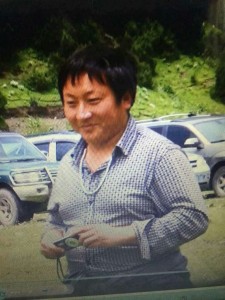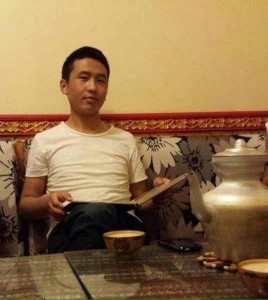
Three Tibetan businessmen and a young poet have been given harsh prison terms in Diru (Ch: Biru) County in Nagchu (Ch: Naqu) Perfecture, Tibet Autonomous Region (TAR).
The three businessmen identified as Sonam Dharwang, Lhanam and Tsering Lhadup, were each sentenced to eight years, while poet Tenzin Kalsang received seven years of imprisonment in May 2015, according to information received by the Tibetan Centre for Human Rights and Democracy (TCHRD).
The businessmen are natives of Kado Village in Choenyi (or Lhenchu) Township in Diru Country in the eastern Tibetan province of Kham. They were charged of ‘inciting quarrels among the public’ and ‘opposing the government’.
There is no information on where the four sentenced Tibetans are held and in what condition. The details of their trials and sentencing are not immediately available.
The travails of the three businessmen began when they opened their own shops selling goods at reasonable, affordable prices, much to the relief of the local Tibetans. This did not bode well with the Chinese shopkeepers who had until then sold Chinese-made goods at exorbitant rates, causing hardships to local Tibetans. Due to the favorable conditions enjoyed by Chinese migrants who are now becoming a major force in many urban Tibetan centers, a large number of Chinese traders continue to make Tibet their base in Tibet, often to the detrimental interests of Tibetan natives. Over the years, many Chinese have settled in Lhenchu township opening shops, restaurants and other business outlets.
The high prices charged by Chinese shopkeepers had imposed enormous burdens on local Tibetan residents who were unable to do anything to tackle this problem. They could not register complaints or file cases against the Chinese businessmen for fear that they would be accused of disrupting the local economy and causing instability.

To lighten burden of local residents, the three Tibetan businessmen opened their own shops. Soon, the demand for goods sold by Chinese shopkeepers fell, as a result of which they filed a case against the three Tibetan businessmen.
Last year, local police arrested the Tibetan businessmen on the grounds of causing ‘political instability’ and in May this year were sentenced to eight years of rigorous imprisonment. TCHRD is unable to confirm the exact date of their arrests.
The young poet Tenzin Kalsang, 25, a native of Samar Village in Choenyi Township, was sentenced to seven years of imprisonment. He was secretly detained in the later part of 2014. After completing his elementary education, he became a monk studying Buddhism at Jhopu Monastery and thereafter at the famous Larung Gar Five Sciences Buddhist Academy at Sertha County in Kardze (Ch: Ganzi) Tibetan Autonomous Prefecture, Sichuan Province.
Tenzin Kalsang had to cut short his studies at Larung Gar following the Chinese policy of forcing monks studying outside of their respective prefectures to return to their own hometowns.

On his return home in Samar, Tenzin Kalsang began teaching Tibetan language, literature and Buddhism to the local Tibetans, and to the Tibetan youth in neighbouring townships—instilling pride in their hearts for Tibetan national identity and culture.
In the preceding year, he studied Chinese language from Lhasa and in 2014, he studied for more than two months under Khangsar Tsultrim, a popular Tibetan scholar at Northwest Nationalities University in Lanzhou. He had written a book titled Tsolnyik (‘The Search’) which was supposed to get published by Gansu People’s Publishing House. However, the Chinese authorities prohibited its publication even after all tasks related to the publication had been completed including designing the book cover.
The reason for the young poet’s punishment remains ambiguous because local Tibetans are not sure whether he was imprisoned for his book or on political allegation for his engagement in promoting Tibetan language in the rural areas and his strong sense of nationalism.
TCHRD condemns in strongest terms the harsh sentences handed down to the four Tibetans, in addition the secrecy surrounding their cases and the arbitrary nature in which they were detained, arrested and sentenced. TCHRD protests the manner in which local Chinese migrants used baseless political accusations against Tibetan businessmen in order to maintain their monopoly over businesses in the Tibetan town of Diru County. The center is distressed to learn that local courts admitted these baseless allegations to sentence the Tibetan businessmen, making the court complicit in perpetrating injustices against the Tibetan businessmen. We call on the Chinese authorities to respect the right to freedom of expression of poet Tenzin Kalsang, whose only ‘crime’ appears to be the activities that he initiated to educate local Tibetans in Tibetan language, culture and religion.
Diru County has borne the brunt of harsh crackdowns and military presence at least since the beginning of 2013. Many known and unknown Tibetans have been arbitrarily arrested and sentenced, with some dying in detention due to brutal torture methods. Despite repeated visits and exhortations from high officials including Chen Quanguo, the TAR party secretary who on a 2013 visit to the prefecture had called on party colleagues to “bring stability and harmony to Nagchu” and Wu Yingjie, a TAR Deputy Party Secretary, local Tibetans particularly in Diru continue to remain defiant.
